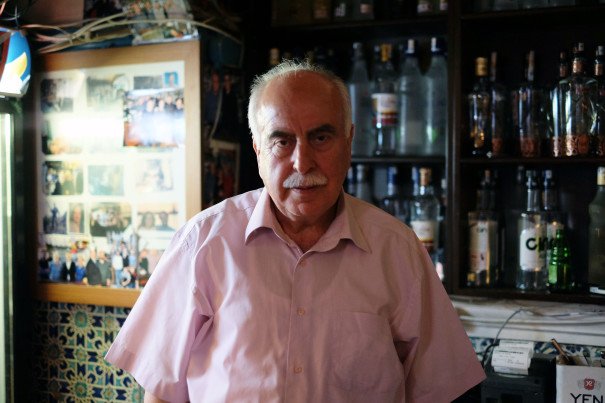
Terminal Nostalgia

Terminal Nostalgia
Mythos in Istanbul
In Istanbul’s iconic Haydarpaşa train terminal, the door of a crowded restaurant and bar opens to beams of sparkling light streaming across the Marmara Sea coast.
Trains haven’t departed Haydarpaşa for nearly three years while the station undergoes extensive renovations, but its restaurant Mythos is still open and popular as ever, a refuge for a faithful crowd of regulars who come to drink at a train station even though they aren’t going anywhere.
Built in the first decade of the 20th century by the Germans and gifted to Sultan Abdülhamid II, the station is a handsome and prominent icon of the city, occupying an imposing presence on the city’s Anatolian shoreline. Haydarpaşa was once the hub for eastward bound international routes that went from strategically crucial to evocatively romantic, lines such as the Taurus Express, which crisscrossed through Anatolia and the Mesopotamian hinterland, hitting Aleppo, Mosul and Baghdad, ultimately arriving in Basra. The route ran until 2003, when the outbreak of the second Iraq War forced it to shut down.
Haydarpaşa was still being used for suburban and long-distance domestic train routes, but in 2013 all services were halted as the renovations began. An initial plan to redevelop the station commercially, threatening to turn it into yet another Istanbul shopping mall, drew the ire of activists and railway employees, many of whom have assembled on Haydarpaşa’s steps every Sunday for the past four years, demanding that the station remain a transit center. Much to their relief, that plan was eventually scrapped and it appears that Haydarpaşa will resume train service within the next couple of years.
Amid all of the confusion and contestation, Mythos—also known as the Haydarpaşa Gar Lokantası (Haydarpaşa Terminal Restaurant)—has remained the terminal’s one constant. Our recent visit found the place packed to the gills on a Monday night.
Though Mythos is a fine meyhane with a fine selection of meze, buttressed by excellent seating options in the nostalgic dining room or outside in the station flanking the train cars, there is also a little corner bar boasting no more than six seats. Most of these are perpetually occupied by the regulars.
Behind the bar is 63-year-old Recep Gül, who has worked at Mythos since 1977, both as bartender and waiter. He prefers cracking open cold bottles of Efes, Turkey’s flagship beer, to working the floor: “You can’t chat while waiting tables,” Gül said.
The soft-spoken, white-haired Gül is the owner of a spontaneous, booze-fueled story that has shaped his entire life. As a 14-year-old in the Black Sea province of Ordu, Gül and his friends were instructed by a teacher of questionable judgment to fetch him a bottle of vodka. Watching their teacher pour himself a drink alongside appetizers of cheese and olives, their curiosity (and thirst) had to be quenched. “Until then, we didn’t know what alcohol was,” Gül said.
The boys bought the same vodka and snacks and sat down for a picnic in a nearby hazelnut orchard. As their first-ever buzz began to set in, they were ratted on by fellow classmates and the teacher in question tossed the teens in a storage room for several hours. Gül’s father eventually got wind of his son’s escapade and delivered a serious beating. “You’re a student, what are you doing drinking alcohol?” he said.
In a life-altering snap decision, the irate Gül hopped a bus to the city of Samsun, then to Ankara, ultimately winding up in Istanbul. He made his way to his older brother’s place in the district of Zeytinburnu, finding work and permanently establishing himself in the city. Gül’s father wrote him letter after letter begging for his son’s forgiveness, and while he eventually came back to visit, Gül’s home had become Istanbul.
“Somehow I couldn’t escape the confines of alcohol,” said Gül with a smile. He’s no binge drinker, but given that his inaugural brush with drink ultimately led to his exile and four-decade stint as a bartender, it has defined his existence.
Though said he plans to retire in two years when he turns 65, we wouldn’t be surprised if he ended up sticking around with his regulars, for whom he pours drinks with ease and comfort.
One of those regulars is Mustafa, sporting a blazer, a charmingly-disheveled salt and pepper mop and a serious mustache. He swigs Efes from a thin glass normally used to serve gin and tonics and other mixed drinks.
“I only drink Efes. I don’t smoke and I never drink rakı,” proclaimed Mustafa, who has been coming to the bar for 25 years, and says he shows up nearly every night of the week. We’ve never witnessed such loyalty to Efes, though we find it to be unfairly maligned and appreciate its merits on a hot summer afternoon. The season is of no importance to Mustafa, who put down at least four during our chat.
Continually going over the bar with a rag, Gül serves us small plates of salty peanuts and tart green plums, the first of the season. While some dusty bottles of gin and Malibu rum adorn the shelves, the anise-flavored rakı and beer are the poisons to pick.
On our second beer, Gül treats us to a slice of Rum böreği, one of Mythos’ specialties and a close cousin of Greek spanikopita. The gentleman to our right insists on buying us a glass of rakı before we leave. While inititally hesitant to go down that route after already having started with beer, we quickly realized our companion was not going to take no for an answer.
The bar at Mythos is not a place to drown one’s sorrows, so if you are planning on shedding tears in your beer, it’s best to stay at home. Gül and the regulars, combined with the nostalgia of a station in limbo and the soothing gaze of the glimmering sea cultivates a soulful yet invigorating atmosphere—even if the trains aren’t running.
This article comes from Culinary Backstreets’ “Behind Bars” series—which celebrates classic drinking establishments from across the globe and, more importantly, the dedicated bartenders who pour drinks there.
